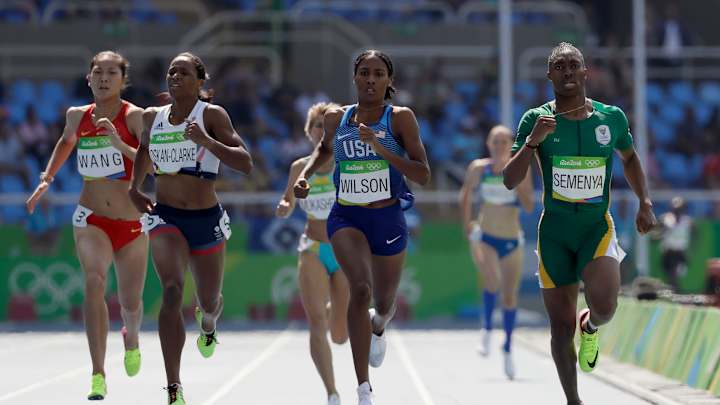Olympians divided about women with high testosterone levels

RIO DE JANEIRO (AP) The Olympic Games is running head long into a storm of controversy involving Caster Semenya. The only thing her competitors agree on: There is no easy solution.
The South African who has become the unwilling face of track and field's sporting, ethical and medical dilemma over women athletes with high levels of testosterone cruised through her 800-meter debut at the Rio Olympics on Wednesday.
After qualifying comfortably for the semifinals, she strode past reporters in the Olympic Stadium without talking. But other competitors in the field had plenty to say. Their feelings ranged from those who embrace Semenya as just another competitor to others who say intersex women should be made to race on their own, arguing that it's not fair for other women to compete against them.
The general consensus seemed to be that there is no easy solution. Track introduced rules in 2011 to govern hyperandrogenism, a condition that can cause women to produce unusually high levels of testosterone, the strength-building hormone in both men and, usually in far lower levels, in women. But those rules are now suspended, after they failed to stand up to a legal challenge brought by Indian sprinter Dutee Chand. At the Rio Games, the suspension means hyperandrogenic women are no longer obliged to follow medical treatment to lower their testosterone levels.
''It's a very peculiar situation, almost unheard of in sports as far I as I know,'' said Luxembourg runner Charline Mathias. ''I don't see how you can stop her from running. A way has to be found. Of course, she has certain advantages. But even with those advantages, she has to work hard. She trains. She suffers. She has worked hard to get here. Plus, she has the eyes of the world upon her. There's a lot of discussion around her. I'm happy I don't have to take a decision on all this, because I would not know what to do.''
Semenya has been under unwanted scrutiny ever since word leaked out in 2009, just before she won the 800-meter world title, that track officials mandated that she undergo sex testing. In the wake of that furor, the International Association of Athletics Federations introduced its rules on hyperandrogenism. They were then suspended by the Court of Arbitration for Sport in 2015. Since then, Semenya has dominated on the road to Rio and is regarded as a nearly certain gold medalist.
For many, the issue boils down to whether the rights of rare athletes like Semenya to compete outweigh those who run against them.
''There's clearly a very big gap between those who are affected by it and those who aren't,'' said French runner Justine Fedronic. ''We'll see how the regulations will change. I think the Olympic Games will probably bring a lot more eyeballs to the issue than there have been before. It's an issue of protecting human rights, but I guess the decision is who has to be protected.
''When you line up against someone like that, you know it's going to be a completely different ball game,'' she added. ''I do feel for her. It is probably not something she was aware of most of her life and she is just trying to be out there are train and compete just like the rest of us, so that is really not fair to her. But it is not fair for others, too. So I don't know what the solution is.''
Semenya has never spoken publicly in detail about her condition. Her default position is generally to talk only about her running. That was the case again on Wednesday, after she ran 1 minute, 59.31 seconds, winning her heat to advance to Thursday's semifinals. South African team officials said Semenya would not answer questions. Instead, she commented on her race and Olympic goals in an audio file released by her team.
''I'm just focusing on enjoying my championships,'' Semenya said. ''Times don't matter in championships but medals, gold medals, silver or bronze, those are targets.''
Semenya appeared to cruise for three-quarters of her Rio debut, only briefly unleashing her power with about 200 to go to ensure she was in a good position.
''Trying to feel my body first so I can feel comfortable,'' she said. ''I tried to get in the top two the last 200 so I can win and then I can be safe for the semifinals.''
Semenya is not the only Olympian thought to be hyperandrogenic. Other competitors in the 800 heats said they are concerned that increasing numbers of women with the condition will follow Semenya's lead and dominate if rules to limit their perceived advantage aren't reintroduced. In its 2015 ruling, the CAS didn't overturn the rules completely, giving the IAAF until July 2017 to produce evidence that androgenic women have a significant performance advantage compared to other women.
''It's probably going to become more and more like that as we move forward, unless something changes,'' said Fedronic.
